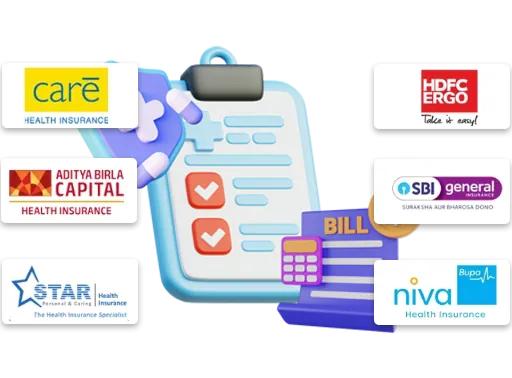- Definition
- Features & Benefits
- Pros & Cons

Simran has over 3 years of experience in content marketing, insurance, and healthcare sectors. Her motto to make health and term insurance simple for our readers has proven to make insurance lingos simple and easy to understand by our readers.
Reviewed By:

Anchita has over 6 years of experience in content marketing, insurance, and healthcare sectors. Her motto to make health and term insurance simple for our readers has proven to make insurance lingos simple and easy to understand by our readers.
Updated on Sep 04, 2024 4 min read




Supplemental Health Insurance: An Intro
Supplement health insurance is the international version of top-up health insurance. It is an additional health insurance plan that helps in paying for the healthcare costs which is not covered by your base health insurance policy. Basically, supplemental health insurance can help pay for the cost gaps and treatments that are not covered by regular health insurance.
What are the Uses of Supplemental Health Insurance?
It can provide you the financial assistance for out-of-pocket expenses at the hospital:
Deductibles- The amount you pay before your insurance starts covering costs.
Co-payments- The fees that you need to pay at the time of service.
Co-insurance- This is the percentage of the cost that you are responsible for after your deductible is paid.
What are the Types of Supplemental Health Insurance?
- Dental Insurance
Dental coverage is the most common in supplemental health insurance plans, as your basic health plan seldom covers the cost of dental problems. Base health insurance that offers dental coverage can be expensive. Comparatively, the average cost of supplemental health insurance for dental procedures is a bit cheaper option. So, supplemental plans for dental covers, as the name suggests cover dental procedures including check-ups, fillings, and extractions. - Vision Insurance
Similarly, this type of insurance covers the cost associated with the eyes. It includes examination, eyeglasses, and contact lenses. There are only a few base health insurance plans that cover the cost of eye surgery and cataracts, but not all plans cover the cost of this basic procedure for vision correction. Thus getting supplemental health insurance for vision is a great idea. - Hospital Indemnity Insurance
Imagine, getting regular payment even when you are not well. Sounds greater no? This hospital indemnity supplemental insurance pays the lump sum benefit for each day in case you are hospitalised for more than 24 hours. - Critical Illness Insurance
Nobody knows when a minor disease can turn into a critical one. So, for extra protection and if you are diagnosed with any covered critical illness like heart attack, stroke, or cancer, this plan pays you the lump sum amount for the treatment. - Disability Insurance
This provides you with income replacement if you become disabled due to an accident or injury and cannot work. - Long-term care insurance
It covers the cost of medical services that you need to opt for long term, such as nursing home care or home health care.
FYI- The specific benefit and coverage limit of the supplemental health insurance plans can vary according to the plan. Understand the plan carefully and review the terms and conditions of the policy you are considering.
Advantages of Supplemental Health Insurance
- Financial Protection: Offers a safety net to cover out-of-pocket medical expenses that your primary insurance may not fully address.
- Peace of Mind: Provides reassurance and reduces financial stress in case of unexpected medical emergencies.
- Customization: Allows you to tailor your coverage to specific needs, such as dental, vision, or critical illness protection.
- Potential Tax Benefits: In some cases, the premiums for supplemental health insurance may be tax-deductible.
Disadvantages of Supplemental Health Insurance
- Additional Costs: Requires paying additional premiums on top of your primary health insurance.
- Limited Coverage: May have restrictions or exclusions, such as pre-existing conditions or certain treatments.
- Potential Overlap: If your primary insurance already covers certain expenses like dental, and vision-related, supplemental insurance might provide redundant benefits.
- Complexity: Understanding the terms and conditions of multiple insurance policies can be challenging.
Bottom Line
Getting supplemental health insurance brings a lot of benefits to your bucket. However, there are some disadvantages too. But, you can overcome them with the complete and right knowledge about your health insurance policy. Moreover, it is very important to carefully consider your individual needs and financial situation before purchasing supplemental health insurance. Consulting with an insurance agent or financial advisor can help you determine if it’s the right choice for you.
We provide all-time, free advice to our customers. Reach out to us if you have any doubts regarding supplement health insurance policy.
Consult for Personalized Insurance Advice

But how does it work?
Schedule a call with India’s number 1 trusted advisor with a 4.5+ rating on Google. We are not your average insurance agents. Our advisors are experts in their insurance knowledge and will give you the right information at the right time. The service is free of cost! Don’t worry, we won’t spam as we value your time.
Health Insurer Network Hospitals
Supplemental Health Insurance : Frequently Asked Questions
1. How does supplemental health insurance work?
Supplemental health insurance acts as a secondary health insurance plan that gives coverage for the expenses that your basic health insurance does not cover.
2. Who should buy a supplemental health insurance plan?
Individuals who need protection against out-of-pocket medical expenses, especially those with chronic conditions or a family history of health problems might benefit from investing in supplemental insurance.
3. How to choose the right supplemental health insurance plan?
Consider your individual needs, financial situation, and the coverage gaps in your primary health insurance. Take advice from the insurance experts on whether supplement health insurance is necessary or not over your base health policy. If yes, then you must purchase one as soon as possible.
4. How do I file a claim for supplemental health insurance?
To claim supplemental health insurance, you need to submit the documentation of the medical expenses and policy documentation.
5. What is the cost of supplement health insurance?
The average cost of the medicare supplement is between $166 to $312.
Health Insurance Companies
Know More About Health Insurance Companies
Share your Valuable Feedback
0
Rated by 0 customers
Was the Information Helpful?
Select Your Rating
We would like to hear from you
Let us know about your experience or any feedback that might help us serve you better in future.


Written By: Simran Saxena
Simran has over 3 years of experience in content marketing, insurance, and healthcare sectors. Her motto to make health and term insurance simple for our readers has proven to make insurance lingos simple and easy to understand by our readers.






 Reviewed By: Anchita Bhattacharyya
Reviewed By: Anchita Bhattacharyya

















Do you have any thoughts you’d like to share?